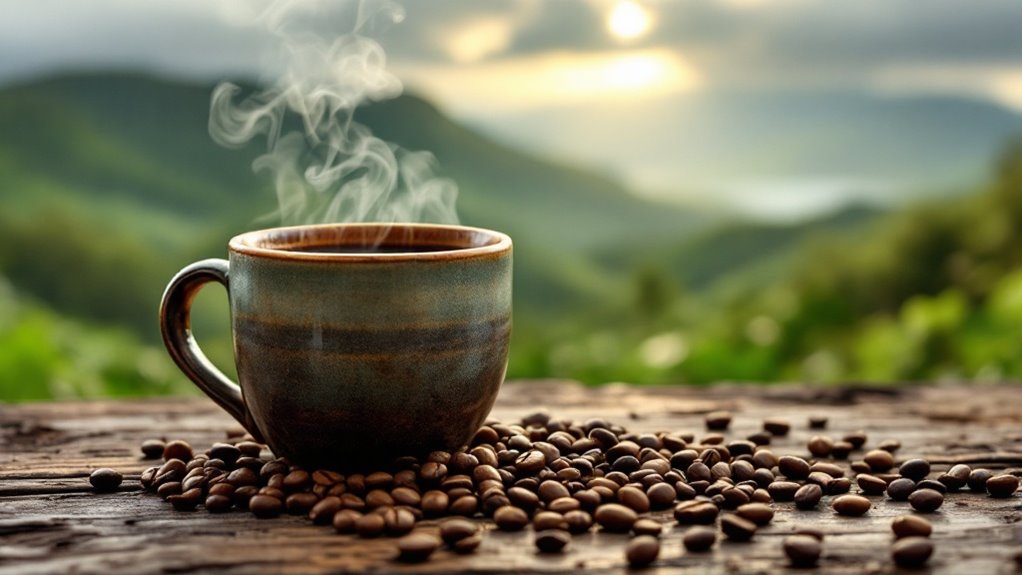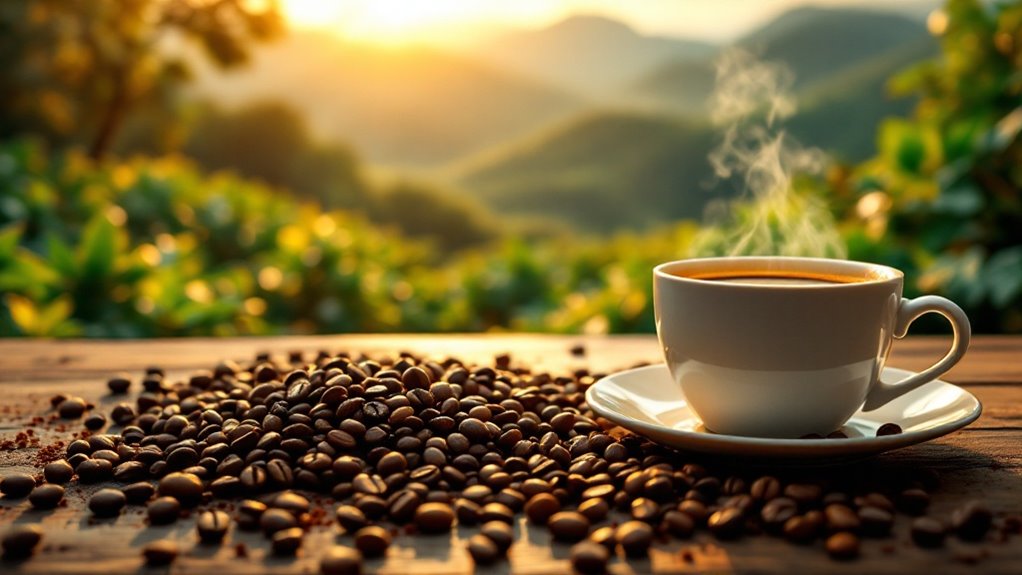



When you think of Jamaica, you might picture pristine beaches or reggae music, but its coffee is equally legendary. Jamaican Blue Mountain coffee stands out as the island's crown jewel, grown in the misty peaks of the Blue Mountains under conditions that are as unique as the brew itself. But what makes it so special? Is it the elevation, the meticulous processing, or the rare flavor notes that set it apart? And how do you know you're getting the real deal? The answers might just change the way you think about your next cup.
Key Takeaways
- Jamaican Blue Mountain coffee is widely regarded as the best coffee from Jamaica, known for its smooth, balanced flavor and bright acidity.
- Grown exclusively in the Blue Mountains at elevations of 3,000–5,600 feet, it benefits from unique terroir and strict quality control.
- Top estates like Clifton Mount and Clydesdale produce premium Arabica Typica beans with floral, citrus, and spicy flavor profiles.
- Authentic Jamaican Blue Mountain coffee must bear the JCIB seal or "Blue Mountain Coffee" trademark to ensure quality and origin.
- Avoid blends or generic "Jamaican coffee" labels; opt for single-origin, 100% Blue Mountain coffee from authorized retailers for authenticity.
History of Jamaica Blue Mountain Coffee
Jamaica Blue Mountain Coffee has been celebrated since the early 19th century, when Jamaica emerged as a leading global coffee producer. Grown exclusively in the Blue Mountains of Jamaica, this coffee quickly gained a reputation for its exceptional flavor and smooth profile. By the mid-20th century, the Jamaican Coffee Industry Board was established to safeguard the integrity of Jamaica Blue Mountain® Coffee. This regulatory body implemented strict quality control measures, ensuring that only beans cultivated at elevations between 3,000 and 5,600 feet could bear the prestigious Blue Mountain label. The Board's oversight extended to every stage of coffee production, from cultivation to export, guaranteeing consistency and excellence.
Following Jamaica's independence in 1962, the government continued to prioritize the protection of this iconic brand. The Coffee Industry Board's licensing system became a model for geographical authenticity, akin to France's AOC wine classification. By defining the Blue Mountains of Jamaica as the sole origin for this coffee, the Board preserved its exclusivity and premium status. Today, Jamaica Blue Mountain® Coffee remains a benchmark for quality, its history deeply intertwined with meticulous regulation and global acclaim.
Unique Growing Conditions in the Blue Mountains
Often shrouded in mist, the Blue Mountains of Jamaica offer a microclimate that's uniquely suited for cultivating some of the world's most exceptional coffee. The region within these mountains, with its fertile volcanic soil, provides the perfect foundation for growing Arabica Typica beans. You'll find coffee here thriving at elevations between 3,000 to 5,600 feet, where the interplay of tropical sunlight and perpetual fog creates a slow maturation process. This extended growth period allows the coffee cherries to develop dense, flavorful beans, despite the relatively modest altitude compared to other high-grown coffees. The cool temperatures and consistent rainfall further enhance the terroir, contributing to the coffee's signature bright acidity, velvety body, and complex flavor profile. Notes of floral, citrus, and spice emerge from the beans, a reflection of the unique conditions of the Blue Mountain region. It's this combination of fertile soil, elevation, and microclimate that sets Jamaica Blue Mountain coffee apart, making it one of the most sought-after and distinctive coffees in the world.
Top Jamaican Coffee Estates: Clifton Mount and Clydesdale
Nestled within the Blue Mountains, Clifton Mount and Clydesdale Estates stand as pillars of Jamaica's coffee heritage, each contributing distinct qualities to the revered Jamaica Blue Mountain coffee. Clifton Mount Estate, perched at 4,300 feet in Newcastle, St. Andrew, spans 250 acres, with 180 acres dedicated to cultivating 100% Arabica Typica. Its eco-friendly practices, including vermiculture and a recycling water system, guarantee sustainable production while yielding coffee with bright acidity, floral notes, and a lingering cocoa aftertaste. Clydesdale Estate, one of Jamaica's first commercial coffee plantations, dates back to the late 1700s and is now a National Heritage site. It also grows Arabica Typica, but its beans are celebrated for their velvety body and subtle spicy undertones, offering a contrasting profile to Clifton Mount's. Both estates hold JACRA certification, a mark of authenticity and premium quality, securing their Jamaica Blue Mountain coffee meets the highest standards. Together, these estates exemplify the meticulous care and tradition that define Jamaica's coffee legacy, delivering exceptional cups that reflect their unique terroir and heritage.
Grading and Certification of Jamaican Coffee
When exploring the world of premium coffee, you'll find that Jamaican Blue Mountain coffee stands apart due to its rigorous grading and certification processes. The Jamaican Government, through the Jamaica Agricultural Commodities Regulatory Authority (JACRA) and the Coffee Industry Board (CIB), enforces strict standards to guarantee the authenticity and quality of Jamaica Coffee. Only beans grown at elevations between 3,000 and 5,600 feet in the Blue Mountains qualify as Jamaican Blue Mountain coffee, while those cultivated at 1,500 to 3,000 feet are classified as Jamaica High Mountain. Below 1,500 feet, the coffee is labeled Jamaica Supreme or Jamaica Low Mountain.
Jamaican Blue Mountain Coffees are graded into four categories: Grade 1, Grade 2, Select, and Peaberry. Grade 1 beans, the largest and most prized, must meet a screen size of 17-19, while Peaberry beans are small and round, offering a unique flavor profile. Each certified bag bears the JCIB seal or the "Blue Mountain Coffee" trademark, guaranteeing its origin and adherence to quality standards. Hand-picking and sun-drying are mandatory, assuring that every cup reflects the meticulous care behind its production. This rigorous system cements Jamaican Blue Mountain coffee as a global benchmark for excellence.
Flavor Profiles of Jamaican Blue Mountain Coffee
You'll notice Jamaican Blue Mountain Coffee's bright acidity immediately, balanced by a velvety body that coats your palate with smooth richness. Its floral, spicy, and citric undertones create a layered complexity, with hints of jasmine, star anise, and citrus zest weaving through each sip. This interplay of flavors, shaped by high-altitude cultivation, delivers a refined and harmonious cup.
Bright Acidity and Velvety Body
Jamaican Blue Mountain coffee's bright acidity is one of its most defining characteristics, offering a vibrant and invigorating quality that sets it apart from other high-altitude coffees. This lively acidity, often described as crisp and revitalizing, balances perfectly with the coffee's velvety body, creating a harmonious and luxurious drinking experience. The smooth taste of these Jamaican beans is a direct result of the unique growing conditions in the Blue Mountains, where high elevation and persistent fog slow the maturation process, allowing the beans to develop a refined complexity. When you sip this coffee, you'll notice how the bright acidity cuts through the richness, leaving a clean and satisfying finish. The velvety texture coats your palate, enhancing the overall sensory experience without overwhelming it. Clifton Mount Estate's Blue Mountain coffee exemplifies this balance, showcasing how the region's terroir contributes to its exceptional quality. Whether you're a seasoned coffee enthusiast or a casual drinker, the interplay of bright acidity and velvety body in Jamaican Blue Mountain coffee guarantees a memorable and smooth taste that lingers long after the last sip.
Floral, Spicy, and Citric Undertones
Beneath the bright acidity and velvety body of Jamaican Blue Mountain coffee lies a layered flavor profile marked by floral, spicy, and citric undertones. The floral notes in this coffee are delicate and aromatic, often evoking the scent of jasmine or hibiscus, which adds a refined elegance to each sip. These floral elements are balanced by subtle spicy undertones, such as hints of cinnamon or nutmeg, which introduce a warm, earthy depth to the flavor. The citric undertones, reminiscent of lemon or orange zest, provide a vibrant and invigorating finish, enhancing the coffee's natural brightness. Together, these characteristics create a harmonious and complex cup that distinguishes Blue Mountain coffee from others. The unique growing conditions of the Blue Mountains—high elevation, fertile soil, and a cool, misty climate—play a pivotal role in developing these nuanced flavors. When you taste Jamaican Blue Mountain coffee, you're experiencing a symphony of floral, spicy, and citric notes that reflect its exceptional terroir and meticulous cultivation.
How to Buy Authentic Jamaican Blue Mountain Coffee
To guarantee you're purchasing authentic Jamaican Blue Mountain coffee, start by sourcing it exclusively from authorized retailers endorsed by the Jamaica Agricultural Commodities Regulatory Authority (JACRA) or the Jamaican Coffee Industry Board (JCIB). These organizations regulate the production and export of Blue Mountain coffee beans, ensuring they meet stringent quality standards. Look for the JCIB seal or the "Blue Mountain Coffee" trademark on the packaging, which certifies the beans are grown in the designated Blue Mountains region at elevations between 2,000 and 5,000 feet. Avoid blends or products labeled as "Jamaica High Mountain" or generic "Jamaican coffee," as these often lack the distinctive flavor profile of true Blue Mountain coffee. Instead, opt for single-origin, 100% Blue Mountain coffee from reputable producers like the Mavis Bank Coffee Factory, known for its meticulous processing methods. Verify the coffee's certification and origin details, as authentic beans are cultivated in specific parishes like St. Andrew and Portland. For added assurance, purchase from trusted retailers like Paradise Roasters, which provide transparent sourcing information and adhere to JCIB standards.
Disclosure: As an Amazon Associate, I earn from qualifying purchases.




